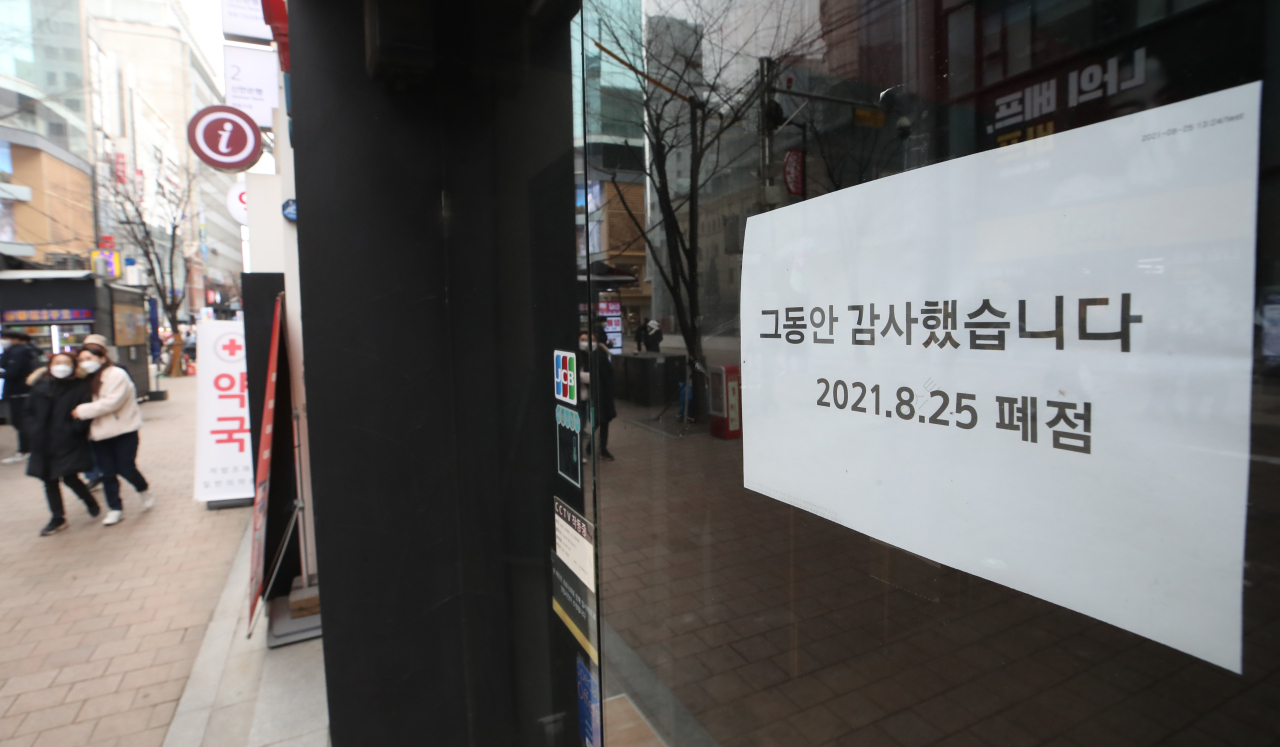
SEJONG -- The number of self-employed workers declined by 18,000 in South Korea last year, despite improvement in employment indices, state data showed Monday.
Self-employed workers refers to non-salaried people who operate businesses without hiring employees or do so with several employees, mostly less than five. The country has a dominant portion of self-employed people engaging in sectors such as food service, lodging, wholesale and retail.
According to Statistics Korea, the tally for self-employed posted 5.51 million in 2021, which is down 18,000 from the previous year. As the figure combines business closures plus openings, the net decline far exceeds 18,000.
The number of self-employed has already decreased by 75,000 in 2020, when businesses were severely hit by COVID-19, with the two-year tally falling more than 900,000 amid the ongoing pandemic.
This situation is contradictory to the overall hiring market, in which the number of employed people increased by 369,000 in 2021 on-year. In 2020, the number of employed declined by 218,000.
Last year, the number of jobs fell by 150,000 in the wholesale and retail sector and by 47,000 in food service and lodging.
By type, the number of self-employed, who hire employees, decreased by 65,000, But the number of self-employed without employees increased by 47,000.
This suggests that more self-employed people dismissed workers and have been classified as those without workers, as part of their move to reduce labor costs in the wake of the protracted sagging turnover during the pandemic.
A labor researcher in Seoul cited the data on payouts of unemployment benefits, in which payments to the self-employed -- whose closed businesses -- surged in provincial areas.
Compared with the Seoul metropolitan area, where conglomerates are clustered, metropolitan cities outside of Seoul -- which has a high portion of self-employed and small business owners -- are thought to have taken a tougher hit from COVID-19, he said.
“The self-employed take up more than 20 percent of the total workforce in Korea. Their difficulty in terms of financial situation could cause huge social problem,” he said.
Apart from the pandemic, difficulties of the self-employed and small business owners had already began in late 2010s following huge burdens of labor costs from the drastic hikes in minimum wage between 2018 and 2020.
By Kim Yon-se (kys@heraldcorp.com)
Self-employed workers refers to non-salaried people who operate businesses without hiring employees or do so with several employees, mostly less than five. The country has a dominant portion of self-employed people engaging in sectors such as food service, lodging, wholesale and retail.
According to Statistics Korea, the tally for self-employed posted 5.51 million in 2021, which is down 18,000 from the previous year. As the figure combines business closures plus openings, the net decline far exceeds 18,000.
The number of self-employed has already decreased by 75,000 in 2020, when businesses were severely hit by COVID-19, with the two-year tally falling more than 900,000 amid the ongoing pandemic.
This situation is contradictory to the overall hiring market, in which the number of employed people increased by 369,000 in 2021 on-year. In 2020, the number of employed declined by 218,000.
Last year, the number of jobs fell by 150,000 in the wholesale and retail sector and by 47,000 in food service and lodging.
By type, the number of self-employed, who hire employees, decreased by 65,000, But the number of self-employed without employees increased by 47,000.
This suggests that more self-employed people dismissed workers and have been classified as those without workers, as part of their move to reduce labor costs in the wake of the protracted sagging turnover during the pandemic.
A labor researcher in Seoul cited the data on payouts of unemployment benefits, in which payments to the self-employed -- whose closed businesses -- surged in provincial areas.
Compared with the Seoul metropolitan area, where conglomerates are clustered, metropolitan cities outside of Seoul -- which has a high portion of self-employed and small business owners -- are thought to have taken a tougher hit from COVID-19, he said.
“The self-employed take up more than 20 percent of the total workforce in Korea. Their difficulty in terms of financial situation could cause huge social problem,” he said.
Apart from the pandemic, difficulties of the self-employed and small business owners had already began in late 2010s following huge burdens of labor costs from the drastic hikes in minimum wage between 2018 and 2020.
By Kim Yon-se (kys@heraldcorp.com)







![[KH Explains] How should Korea adjust its trade defenses against Chinese EVs?](http://res.heraldm.com/phpwas/restmb_idxmake.php?idx=644&simg=/content/image/2024/04/15/20240415050562_0.jpg&u=20240415144419)










![[Today’s K-pop] Stray Kids to return soon: report](http://res.heraldm.com/phpwas/restmb_idxmake.php?idx=642&simg=/content/image/2024/04/16/20240416050713_0.jpg&u=)